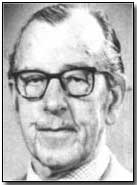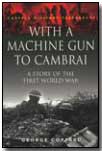Prose & Poetry - George Coppard
 George Coppard (1898-1984), who served
as a machine gunner during World War One, was the author of a famed wartime memoir,
With a Machine Gun to Cambrai.
George Coppard (1898-1984), who served
as a machine gunner during World War One, was the author of a famed wartime memoir,
With a Machine Gun to Cambrai.
Born on 26 January 1898 Coppard left school - Fairlight Place - at the age of 13 to begin his working life with a firm of taxidermists.
With the outbreak of war in August 1914 Coppard resolved to sign up, which he did by lying about his age, claiming to be 19 years of age (instead of 16, his true age). Thus, having illegally joined the British army Coppard was assigned to the 6th Battalion Royal West Surrey Regiment and sent to Guildford for training as a private soldier.
Subsequently despatched to France the following June Coppard found himself a member of a Vickers machine-gun unit, seeing action that September during the Loos offensive. The following year, 1916, he saw further service during the Battle of the Somme.
Misfortune struck on 17 October 1916 when he was accidentally shot in the foot by a colleague. Regarded suspiciously by officialdom, Coppard was sent to hospital as a 'SIW' case (self-inflicted wound).
Subsequently cleared of the crime Coppard returned to the Western Front in time to serve at the Third Battle of Arras. Promoted corporal in October 1917 Coppard took part in the Battle of Cambrai the following month.
 During this action Coppard
received a serious thigh wound to the femoral artery and was only saved by
the quick-thinking of a colleague who used his shoe-laces to form a
tourniquet to stem his bleeding. Coppard subsequently received the
Military Medal for bravery at Cambrai.
During this action Coppard
received a serious thigh wound to the femoral artery and was only saved by
the quick-thinking of a colleague who used his shoe-laces to form a
tourniquet to stem his bleeding. Coppard subsequently received the
Military Medal for bravery at Cambrai.
With the armistice Coppard was discharged in 1919 and, following a period of unemployment, sought employment as an assistant steward at a golf club and thereafter in various sundry appointments. He retired in 1962 having worked at the Ministry of National Insurance since 1946.
During retirement Coppard sought and received encouragement from the Imperial War Museum to have his wartime diaries published. Published in 1969 With a Machine Gun to Cambrai proved an instant success, prompting his contemporaries to publish their own wartime accounts.
George Coppard died in 1984.
A "listening post" was an advanced post, usually in no-man's land, where soldiers tried to find out information about the enemy.
- Did you know?
